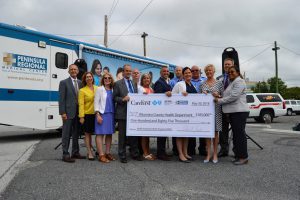
The Wicomico County Health Department announced today that it has received a two-year $90,000 grant from Maryland Community Health Resource Commission (CHRC). The grant will further support the Salisbury Wicomico Integrated Firstcare Team (SWIFT) – a collaboration between the County Health Department, Salisbury Emergency Medical Services (EMS) and Peninsula Regional Medical Center. The grant from the CHRC follows an initial grant of $95,000 from CareFirst BlueCross BlueShield (CareFirst), which helped launch the program this past October.
“We are thrilled to support the SWIFT program,” commented Dr. Allan Anderson, CHRC Chairman. “The Commission looks to support projects that are innovative, sustainable, and replicable, and this project is totally in line with our mission of expanding access and serving vulnerable populations.”
“As a not-for-profit insurer with a mission to improve the health of our region, we are proud to support the Wicomico County Health Department SWIFT program and their efforts to improve the health of our most vulnerable residents”, commented Julie Wagner, Vice President, Community Affairs, CareFirst BlueCross BlueShield.
Since October 2017, the SWIFT team has been assisting a population of frequent EMS users who call for non-emergency aid at least five times over any six-month period. SWIFT’s goal is to lessen users’ reliance on Salisbury First Department (SFD) EMS and PRMC for healthcare services that are more appropriately provided in a primary or specialty care setting.
“Our collaborative network of partners and stakeholders will be the key to sustained success of the SWIFT program and the ongoing efforts to improve access to care for the most vulnerable populations in Wicomico County,” said Lori Brewster, Health Officer.
SFD EMS serves as the day-to-day primary SWIFT lead, with a dedicated Emergency Medical Technician Paramedic (EMT-P) who acts as the point person to identify the long-term needs of patients, make necessary referrals, and enroll interested frequent users into the SWIFT program. To date, 33 people have opted into the program. Only one person has declined to participate. The new grant will fund the EMT-P position for the next two years.
SWIFT is experiencing significant early success. Those enrolled had called EMS for assistance 203 times before the program’s debut on Oct. 19, 2017. Since SWIFT’s implementation, that number has dropped to 86. Similarly, before the program, these individuals accounted for 197 visits to PRMC’s Emergency Department, but just 107 since.
Program participants receive regular in-home visits by the SWIFT team, which includes an EMT-P, a Nurse Practitioner and a Registered Nurse, both from PRMC. They conduct vital signs checks, assess for needs such as transportation and financial support, do examinations for signs of abuse or neglect, provide healthcare education and assist with referral to a primary care physician, in-home care or other specialists if needed.
SWIFT coordinator Christopher Truitt stated that, “As a testament to the success of SWIFT, considering patients who have been enrolled in the program for at least six months, emergency services have experienced a 34% decrease in their 9-1-1 utilization and a 24% decrease in their overall number of emergency room visits. It has become clear that we are addressing needs in our community that had long been overlooked; as such, we are inspired by the success of this program and look forward to expanding it in the years to come.”
Equally as satisfying is that the SWIFT team has made 50 referrals to available resources including Social Services, Adult Protective Services, Wicomico County Health Department programs, MAC, Inc. Area Agency on Aging, Bay Area Center for Independent Living and others. They’ve also conducted over 30 medication reconciliations, ensuring that people were taking the right prescriptions, the right doses and at the right time. The SWIFT team has also arranged transportation a number of times to physician offices and other locations where assistance is provided.
“Frequent users are not necessarily overusing the system by choice. They often are facing socio-economic and real-life challenges like loneliness, neglect, a lack of education and/or transportation or a financial barrier that prevents them from connecting regularly with the appropriate forms of healthcare services,” said Kathryn Fiddler, DNP, RN, NE-BC, Vice President of Population Health at PRMC. “We are breaking down those barriers with the SWIFT program, it’s working, and hopefully establishing permanent behavioral changes that will result in reducing stress for patients and on the system.”
An added benefit for the SWIFT team is the ability to educate those they visit on chronic diseases like diabetes, heart disease, cancer and stroke, and to provide the necessary assistance to people seeking help with those issues.



